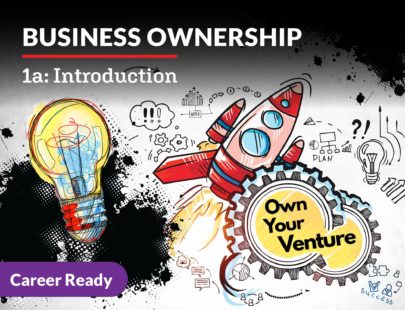
Accounting 1a: Introduction
Accounting is more than numbers and spreadsheets; it’s about unlocking the secrets of financial success and understanding how to drive a company forward. The individual who understands business finances holds sway in the organization. From decoding financial statements to mastering corporate ethics, real-world scenarios expose you to accounting principles and provide opportunities to apply your knowledge. Whether you’re exploring if accounting aligns with your career aspirations or you dream of becoming an entrepreneur and want to gain a deeper understanding of managing the “books”, this course will empower you to navigate accounting and make excellent decisions.
Units at a Glance
Unit 1: Accounting Foundations
Have you ever thought about building a house? Learning the foundations of accounting is like creating a strong foundation for a house. The elements in this unit will show you the solid foundation on which an accounting department is formed. You will understand what roles are assigned and what functions are served, along with the specific principles that accountants follow. Accounting is the language of business. Mastering its basics is essential for making informed financial decisions, whether you are running a business, investing, or working in finance.
Unit 2: Charting Your Career in Accounting
Thinking about a job in accounting is like stepping up to the plate during a baseball game. There are opportunities all around you, but you must be able to connect with them and make the most of them. In this unit, you will learn about the exciting job opportunities in accounting and what skills you will need to get those jobs and hit your career out of the park.
Unit 3: Navigating Personal and Business Accounting Like a Pro
This unit equips you with key skills for personal financial planning by covering goal setting and effective planning strategies. You’ll also explore financial statements for manufacturing and merchandising companies to better interpret, analyze, and understand those documents. As part of this, you’ll delve into organizational structures, comparing those structures through an examination of their details. By the end, you’ll be well prepared to plan for personal financial success and to understand the financial transactions that businesses make, while also grasping the nuances of different organizational structures.
Unit 4: Beginning the Accounting Cycle—Journals
Have you ever read someone’s diary? And learned all the details of what happened each day of their life? If you have kept a diary or a journal, you were able to look back on those events and remember them—some good and some bad. In this unit, we are going to learn how to prepare and read a business’s journal. Each and every financial activity that a company engages in is recorded in their journal. It is the initial, and very important, step in preparing the company’s financial statements.
Unit 5: Mastering the Financial Nexus: Unraveling the Ledger’s Power
Welcome to another exciting chapter in your financial journey. This unit digs into the core framework of accounting. It provides you with the tools to navigate and understand the details of a company’s financial records. We will take a journey through the essential elements of accounting that form the backbone of financial reporting. We’ll also look at the chart of accounts, an organizational structure that categorizes transactions; the general ledger, the central location of a company’s financial data; and the pivotal role of adjusting and closing entries, which ensure accurate financial statements. Along the way, we will dig into the details of the trial balance and introduce worksheets as powerful tools used in preparing financial statements.
Unit 6: Accrual Accounting: Unveiling the Financial Reality
In this unit, we’re diving into some important stuff—that is, how businesses keep their financials in check, prevent fraud, manage their tech, and stay safe online. We will start by understanding the nuts and bolts of internal controls—the secret sauce organizations use to make sure their financial matters are on track. Then, we will examine practical skills for spotting and stopping fraud. We’ll break down the foundations of accounting information systems (AIS) and chat about the wild world of cybersecurity. Finally, we’ll look at the different types of organizations these issues affect. It’s going to be an adventure packed unit with practical know-how applied to real-world challenges.
Unit 7: Financial Storytelling
Continuing along our path through financial statements, this unit shines a spotlight on the vital role income statements play in understanding a company’s financial position. We’ll begin with an overview of the different methods used to prepare the income statement, digging into the benefits of each model. We will go on to break down the sections of the income statement, taking a deep dive into each. With that under our belts, we’ll look at the tools needed to properly analyze the information included in the income statement.
Unit 8: Financial Storytelling, Part 2
Financial statements are like a report card for a business, helping people understand how well it’s doing financially. These documents show important information about a company’s financial health. They tell you how much money the company made, how much it spent, and how much it owes and owns. They are important for investors, lenders, and managers to make decisions about the company’s future.


